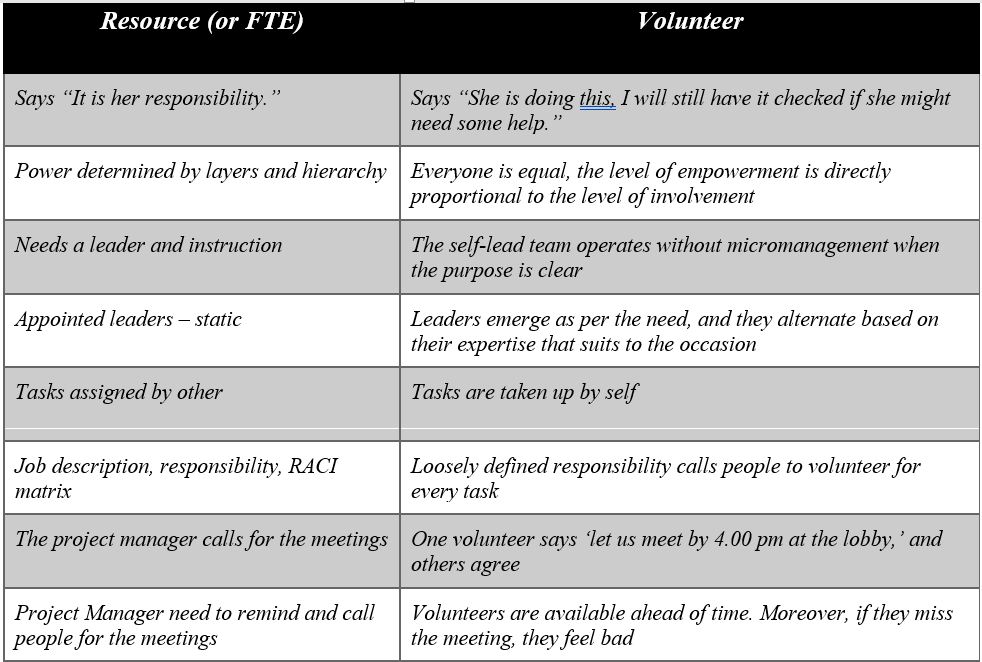
PARABLES OF A PROJECT MANAGER
In one sense, ‘everyone is a project manager’ in an organization. The one who has planned for a vacation has already been in the role of a project manager. When you are planning a vacation, what do we start with? We begin with the destination. Beginning with the end in mind is the first step in vacation planning. For a project, the scope document indicated the product or services that need to be created at the end. Once the destination is fixed, then we start planning and booking resorts and hotels. Then planning out our journey from one point to another point. All these intermediate points in projects are milestones. All the reservations which are happening are planned. We enjoy the vacation with the process of planning, organizing and execution, control and closeout. So, everyone is a project manager, and a project manager becomes a better manager by using a set of appropriate tools.
Project management has become an art of influencing and converging diverse groups towards a common objective. It is more to do with anticipating issues that shape conditions, working on various alternatives and opportunities, and controlling chaos in the system. It is about managing variables in the undercurrent of change and restructuring. This calls for a lot of skills and tools needed to not only survive but to thrive in complex projects.
Moving on, instead of myriad theories, it is powerful to illustrate the project management through stories. Indeed, these real stories inspire a lot on importance of communication and collaboration in project management.
STORY OF API
It was a beautiful morning, and I, along with my colleague, called upon an enthusiastic IT start-up company partner to our corporate office in order to discuss the possibility of making automated dashboards from various applications. You know, the Pharma domain is unique, and we would love to have someone who has a deep understanding of the domain to work with us. The partner claimed that he had already worked on a couple of assignments in this startup and as a part of a more extensive career from which he had begun this venture.
Moved by this, we went on discussing further. “What do you think is the most critical success factor in such a pharma project?” I asked. “API” the reply was spontaneous, “It is very complex to develop, and there are multiple moving parts, hence in my experience, there are many instances we are stumbling upon this, and we have to be extremely vigilant about this”. We were stunned to look at the thorough understanding of an IT buddy in a complex domain like pharma. He was bang on!

The discussion went on, we discussed various strategies to control and risk mitigate API. At one point in time, when it became overwhelming, we started realizing that there is something drastically wrong with this conversation. The partner started saying many things which we have not heard before. Further probing proved that the API which he referred to had an entirely different meaning ‘Application Programming Interface.’ The API which we all had in our mind is ‘Active Pharmaceutical Ingredient’ is the ingredient of any drug that produces its effects.
Indeed, the partner had profound insights into API, the Application Programming Interface is a set of subroutine definitions, protocols, and tools for building application software. API still remains a significant challenge when integrating multiple bespoke software applications and trying to do something meaningful, such as what we were driving to accomplish, but the API which he spoke about and the API we had in mind are entirely different.
The moral of the story:
- Reconsider the use of abbreviations, however h-tech it sounds like, even though the full form is such a boring phrase, particularly when you have some outsider in the room
- Communication is the key, in projects, life and everything
- Words belong to us, the meaning belongs to the receiver, hence verify
Transitioning to the second story, we explore the transformative power of volunteers. Assembling a team for an event unveils a different ecosystem—one fueled by passion, ownership, and unmatched dedication. The comparison between regular project work and the volunteer-driven event prompts reflection on the untapped potential within project teams.
THE POWER OF VOLUNTEERS
I had an opportunity to put together a team of volunteers, to organize an event. The event was very successful, and there is an immense involvement of the volunteers in making this event a success. These are the same colleagues who work on our projects, yet when they volunteer for an assignment, the ecosystem is altogether different compared to the regular project work. The speed, morale, ownership, and involvement are tall, and it is a pleasure watching them accomplish the tasks one after another.
I could not resist my temptation to think about what if our project teams consist of ‘volunteers’ instead of ‘resources.’ Sometimes, do we undermine the capability of human potential when we consider them as mere headcount or FTE in a project? Some of the noticeable differences between resources and volunteers from this experience are as below.

 People who are engaged in projects are the individuals who bring the required expertise to the project. They do not consider themselves as numbers like FTE, headcount, or resources.
People who are engaged in projects are the individuals who bring the required expertise to the project. They do not consider themselves as numbers like FTE, headcount, or resources.
In the dichotomy between resources and volunteers, the question arises: do we truly harness the full potential of human capability when we view team members merely as headcount or FTE (Full-Time Equivalent)? The distinction between those who are assigned as mere resources and those volunteering for a cause sheds light on the undeniable impact of passion, morale, and a sense of ownership.
These stories are an excerpt from the book, “Leadership Journey of a Project Manager” by John Robert.
 Here are a couple of stories from project management, and there are even more out there. Our lives are like a collection of stories, full of chances to get inspired. Stories have this cool ability to grab our attention and teach us things. Our ancestors used them in big stories, and now we start learning with stories in schools, turning into case studies in business classes—all to leave a lasting impression and learn something useful.
Here are a couple of stories from project management, and there are even more out there. Our lives are like a collection of stories, full of chances to get inspired. Stories have this cool ability to grab our attention and teach us things. Our ancestors used them in big stories, and now we start learning with stories in schools, turning into case studies in business classes—all to leave a lasting impression and learn something useful.
Nowadays, people don’t have a lot of time to focus, so these short stories are perfect for a quick read in just two minutes. Besides being short, these stories pack in some good lessons that can help you make better decisions, lead people, and solve problems. Plus, you can use them as cool examples to inspire your team, because telling stories is a great way to make a point.
John Robert over the years has shared several stories, and case studies with his readers. On demand from LinkedIn readers, he’s putting together a book called “2 Minute Stories,” set to be unveiled at the 7th Annual Pharma Project & Portfolio Management 2024 from January 17th – 19th in Goa.


I really enjoyed this blog.
Your perspective on the dynamic role of a project manager is amazing.
I enjoyed reading every bit of it and looking forward to more of such blogs.
Thank you 🙂
Thank you so much, stay tuned to read more blogs
Thanks, Vienna, More stories are lined up!
I appreciate this story, with powerful message. Agreed that, we should not just blindly assume that both parties are in same page of understanding with respect to using the Abbreviations.
Indeed, The word belongs to the speaker, meaning belongs to the receiver!